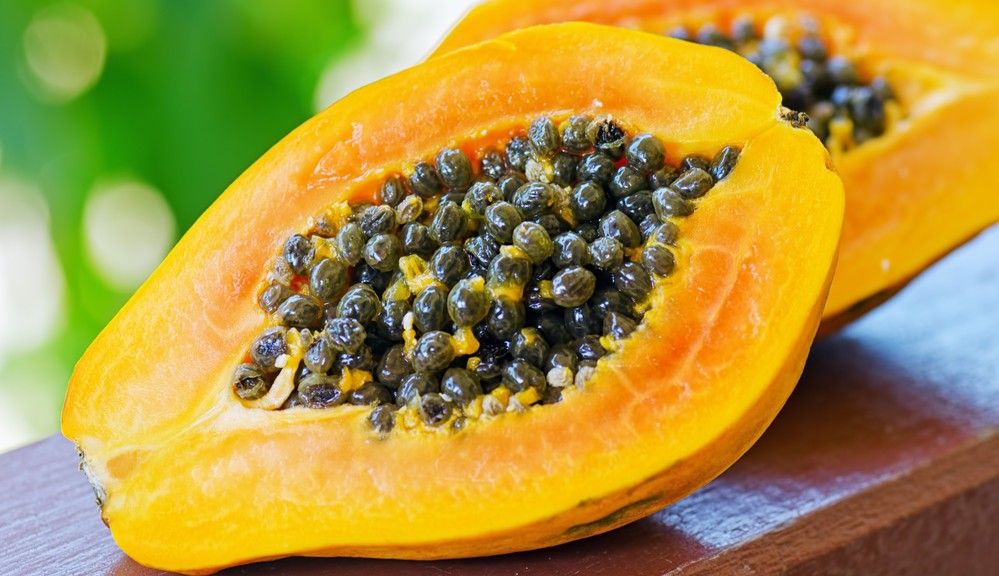
Previous
Snacking 101: Protein Bars for a Lean Liver

Next
Sitting Is Bad News for the Liver
Papaya Seeds for Liver Health
Learn about papaya seeds’ digestive enhancing enzymes, and why seeds from this fruit are an ally for liver health.
The papaya (Carica papaya), papaw or pawpaw fruit grows in tropical climates and is an antioxidant powerhouse. Traditionally, papaya has been used to treat everything from sinuses, burns, eczema and tumors to blood pressure, constipation and parasites, along with a variety of digestive ailments. Papaya contains Vitamins A, B, C and E, as well as iron, calcium, magnesium, potassium, choline and cancer-fighting lycopene.
The real power of papaya, though, is in the digestive enhancing enzymes: papain and chymopapain. These powerful enzymes are found in the leaves, fruit and especially in the seeds of the papaya.
Papaya Seeds
Papaya seeds are even more potent than the fruit and can be added to the diet after being dried and ground, or as an extract. The papaya seeds are spicy to the taste much like black pepper and, in fact, they are often used as a substitute because they have a similar flavor. Most importantly, adding about 5-6 seeds ground, or about 1 teaspoon, can add powerful enzymes to your diet and improve digestive health along with liver function.
Liver Health
A primary function of the liver is to produce the proteins necessary for blood clotting, to breakdown old or damaged blood cells, and metabolize fats. Liver cells digest proteins by breaking them up and changing the amino acids (building blocks of proteins) so they can be used by the body as energy. The liver also stores vitamins and iron for later use.
Papain and Chymopapain
A big reason papaya seeds are so commonly used in treating digestive issues is due to their high concentration of proteolytic enzymes, papain and chymopapain, which aid digestion in the breakdown of proteins. Adding papain in the form of dried, ground papaya seeds to your diet increases digestion (which reduces the work load on the liver), and improves nutrient absorption of high protein foods overall. Papain also acts as a powerful antioxidant by protecting the body from cellular damage from free radicals and acts to reduce inflammation in the liver.
Similar to papain, chymopapain dissolves proteins, just more slowly. In fact, papain and chymopapain share 126 identical amino acids. Chymopapain is often injected into spinal disks to dissolve damaged soft tissue structures that are causing pain and to reduce swelling.
Both of these compounds aid in liver health by reducing the digestive load on the liver, and assisting in the breakdown of large proteins for use by the body.
Studies have shown that treatment with papaya seed extract before drug induced liver toxicity (in animals) protected the liver and allowed for it to function normally throughout the trial. When eating the papaya fruit as well, the high fiber content further enhances the digestive properties, making the fruit itself an excellent aid for all matters of digestive ailments.
Overall, papaya is a powerful, liver-friendly food. The fruit and the dried, ground seeds as well as papaya seed extract offer powerful antioxidants and aid in liver health by providing aid in digesting high protein foods. Anyone dealing with challenges to liver health, whether from cirrhosis, Hepatitis B, Hepatitis C or even fatty liver, may benefit from the addition of papaya seeds to their diet.
Use Papaya Seed for a Liver Healthy Smoothie
- 1 handful of parsley
- 1 peeled, seeded orange
- 1 peeled, seeded lemon
- 1 cup greens (dandelion greens preferred) Read how dandelions can benefit your liver.
- 1 teaspoon ground papaya seed
Caution: Papaya produces a latex-type fluid, especially before ripe, that may cause irritation and bring on an allergic reaction. Papaya seed extract has also been shown to have contraceptive effects in large doses, but has not been tested in humans.
Aravind, G., Bhowmik, D., Duriavel, S., Harish, G. (2013). Traditional and medicinal uses of Carica papaya. Journal of Medicinal Plants Studies. 1(1). Pp. 7-15. Retrieved on 8/20/15 from http://www.plantsjournal.com/vol1Issue1/Issue_jan_2013/2.pdf.
Adeneye, A.A., Olagunju, J.A., Banjo, A.A.F., Abdul, S.F., Sanusi, O.A., Sanni, O.O., et al. (2009). The aqueous seed extract of Carica papaya Linn. Prevents carbon Tetrachloride induced hepatotoxicity in rats. International Journal of Applied Research in Natural Products. 2(19). Retrieved on 8/22/15 from http://www.researchgate.net/publication/43772079_The_Aqueous_Seed_Extract_Of_Carica_papaya_Linn._Prevents_Carbon_Tetrachloride_Induced_Hepatotoxicity_In_Rats.
Eyo, J. E., Levi, C. A., Asogwa, C. N., Odii, E. C., Chukwuka, C. O., Ivoke, N., Onoja, U.S., Onyeke, C. C. (2013). Toxicity and effect of Carica Papaya seed aqueous extract on liver biomarkers of Clarias Gariepinus. International Journal of Indigenous Medicinal Plants, 46(3), 1301 - 1307. Retrieved August 20, 2015, from http://www.academia.edu/4244827/Toxicity_and_Effect_of_Carica_Papaya_Seed_Aqueous_Extract_on_Liver_Biomarkers_of_Clarias_Gariepinus.
Group, E., Dr. (2013). The health benefits of papain. Global Healing Center. Retrieved on 8/27/15 from http://www.globalhealingcenter.com/natural-health/papain/.
PubMed Health. (2015). How does the liver work? PubMed. Retrieved on 8/20/15 from http://www.ncbi.nlm.nih.gov/pubmedhealth/PMH0072577/.
Rajkapoor, B., Jayakar, B., Kavimani, S. and Murugesh, N. (2001). Effect of dried fruits of Carica papaya Linn on hepatoxicity. Biological & Pharmaceutical Bulletin. 25(12). Pp. 1645-1646. Retrieved on 8/20/15 from https://www.jstage.jst.go.jp/article/bpb/25/12/25_12_1645/_article.
Singh, O.; Ali, M. (2011). Phytochemical and antifungal profiles of the seeds of Carica Papaya L. Indian Journal of Pharmaceutical Sciences. 73(4). Pp. 447-451. Retrieved on 8/20/15 from http://www.ncbi.nlm.nih.gov/pmc/articles/PMC3374564/?report=printable.
Uduak, U., Timbuak, J.A., Musa, S.A., Hamman, W.O., Asala, S. Hambolu, J. and Anuka, J.A. (2013). Chronic hepatotoxicity and nephrotoxicity study of orally administered aqueous and ethanolic extracts of Carcia papaya seeds in adult Wistar rats. British Journal of Pharmacology and Toxicology. 4(4): 147-154. Retrieved on 8/20/15 from http://maxwellsci.com/print/bjpt/v4-147-154.pdf.
Ware, M. RDN LD. (2015, June). Papaya: Health benefits, uses and risks. Medical News Today. Retrieved on 8/20/15 from http://www.medicalnewstoday.com/articles/275517.php.







I love papaya smoothies, can i just add the fresh seeds to the blender?,or they have to be dried and ground first?
Read the mssg. carefully
I know that papaya is mostly GMO!